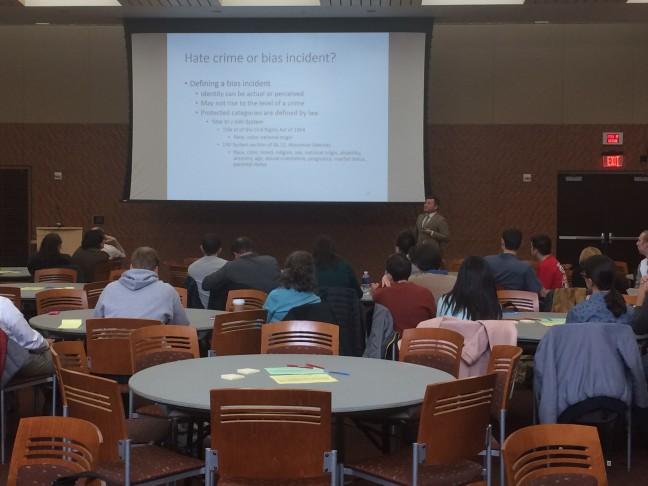In light of recent hate crimes on campus, the University of Wisconsin’s Incident Response Team held an information session on the hate and bias process Thursday.
At the information session at Gordon Dining and Event Center, members of the incident response team spoke on the process of how a reported crime is handled and the outlets for victims to reach out to if affected by an instance of hate.
Assistant Dean of Students and LGBT Campus Center director Gabe Javier said the incident team responds to crimes of bias and hate on campus, creates awareness about ways to report such incidents and tries to prevent incidents on campus.
“We have seen more incidents in the past semester, but we know these incidents are not new,” Javier said. “Increasing awareness has increased the number of reports.”
Confronting #TheRealUW: Marginalized students reveal experiences of an unwelcoming campus
Hate vs. bias crimes
Javier said about 60 percent of minorities on low diversity campuses report instances of verbal discrimination. Due to the prevalence of such hate or bias incidents, it is important the university holds individuals accountable for their actions, Javier said.
Anton Altman, Clery compliance assistant director at UW Police Department, said the difference between a hate crime and bias incident is that bias incidents are not criminal. This means they may be in the form of speech, written words or visuals. Hate crimes, on the other hand, are crimes in the eyes of the law, such as assault, arson, theft or vandalism, he said.
Yet in both instances, the victim’s actual or perceived identity was targeted or a factor in the action, Altman said.
“There are people who say they didn’t have an intent to commit a bias or hateful incident, but that doesn’t mean the incident didn’t happen,” he said.
UW officials respond to swastika ‘bias incident’ in campus dorm
Reporting incidents at UW
When reporting a hate crime, victims can report either for the purposes of information or action, Javier said. This means an affected person can choose if they just want to notify the team on an instance of hate, or if they want the team to take action and follow up with them on the instance.
Following the reception of a report of hate or bias, the hate and bias response team contacts the targeted person if requested, Javier said. Then, UWPD are involved if the crime took place on campus. If the responsible individual is known, a conduct process begins. If they are unknown, the team will investigate.
“What’s important is knowing that, if at all possible, we try to find out who the responsible individual is,” Javier said.
Consequences of the crimes
If a student is found responsible for a hate crime, possible sanctions include a written reprimand, disciplinary probation, suspension, expulsion, educational or service sanctions such as community service or payment of restitution, Noreen Siddiqui, Office of Student Conduct and Community Standards student conduct coordinator, said.
If a student is facing suspension or expulsion, a formal hearing is held unless the student waives their right to have one, Siddiqui said.
To create a safer campus environment, it is important for people to engage in conversations about hate and bias incidents and encourage people to report incidents, Javier said. It is important for these conversations to take place to create change, he said.
“Our hope is that from knowing our process here, it will help us demystify the hate and bias reporting process,” Javier said.
Brooke Evans, a UW student and McNair scholar, said it is great for students to be informed on issues of hate crimes and how to report them, but wondered at what point faculty and staff need to be trained on the issue as well.
“I think the conversation is important and it’s traumatic,” Evans said.
To report an incident of hate, visit go.wisc.edu/reporthateandbias, or students.wisc.edu/reporthate.





















